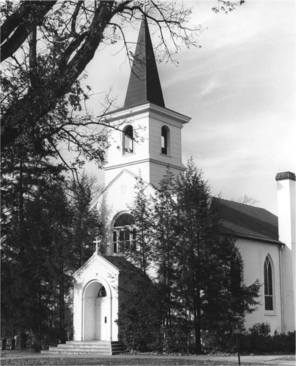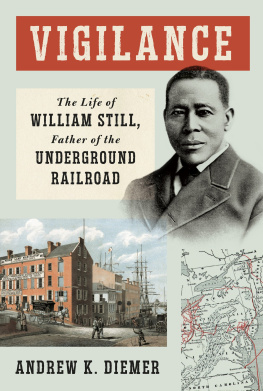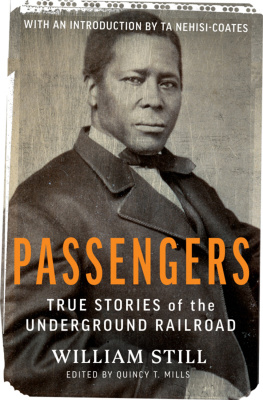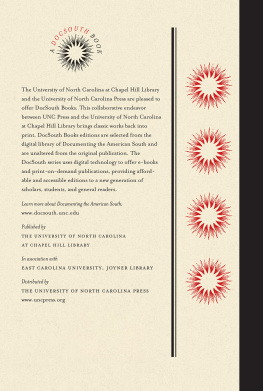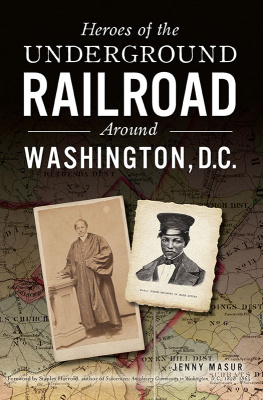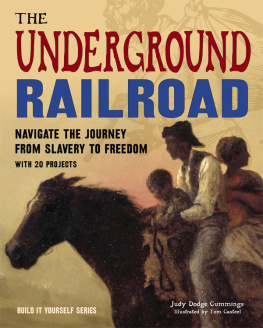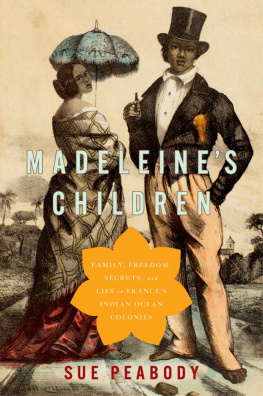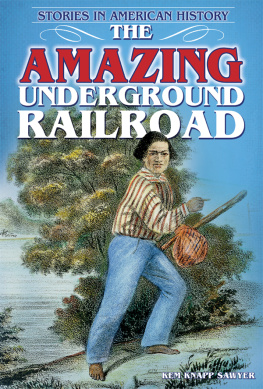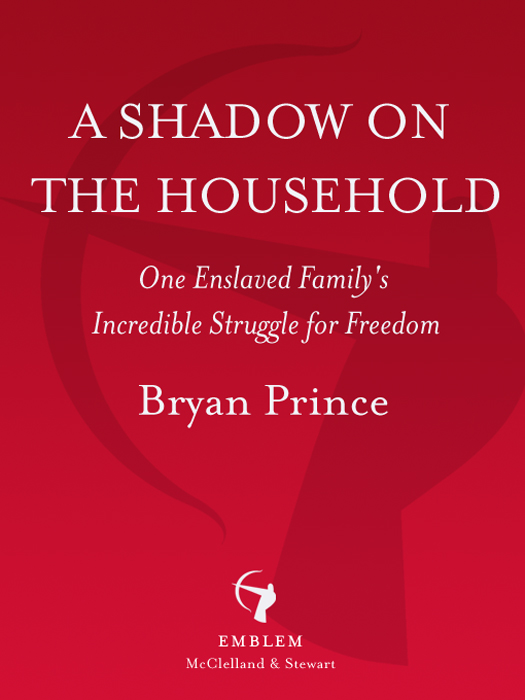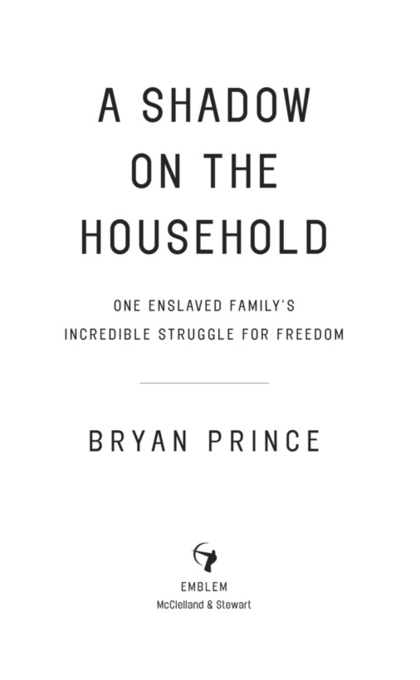Critical Acclaim for
A SHADOW ON THE HOUSEHOLD
[A] COMPELLING work of popular history Extensive details and background make for CHILLING AND GUT-RENDING reading. Accounts such as this peoples history remind us of our inhumanity, but also of the good that devotion and commitment can achieve.
Winnipeg Free Press
Prince, a Buxton-area farmer and a descendant of slaves, clearly possesses a remarkable understanding of the history of the subject he has written about. A Shadow on the Household is AN UNRELENTING TRIUMPH; A GLOWING, EXHAUSTIVELY RESEARCHED AND UTTERLY SINCERE work that demonstrates how tight family ties can be. O UTSTANDING.
SCENE magazine
What a fascinating story! With prodigious research, a fine eye for detail, and a deep respect for a family who endured the most painful trauma under the slave system that governed their lives, Bryan Prince brings the DRAMATIC tale of Arabella and John Weems and their nine children to life. P RINCE IS AN ACCOMPLISHED STORYTELLER.
Karolyn Smardz Frost, Governor Generals Awardwinning author of Ive Got a Home in Glory Land
A GRIPPING AND COMPREHENSIVE historical investigation that will draw you in and make you think.
Montreal Gazette
The POWERFUL DRAMA of the Weems familys pursuit of freedom is beautifully and hauntingly retold here through Bryan Princes remarkable storytelling skill. A Shadow on the Household is AN EXTRAORDINARY TALE of the powerful bonds of family that even slavery and forced separation could not destroy. A MUST READ.
Kate Clifford Larson, Ph.D., author of Bound for the Promised Land: Harriet Tubman, Portrait of an American Hero
A VIVID AND INTIMATE portrait of love amidst constant uncertainty The narrative is FAST-PACED AND WELL WRITTEN.
Quill & Quire
A Shadow on the Household contrasts slaverys insidious and cruel assault on the black family with the Weems familys UNFLAGGING, COURAGEOUS, HEARTBREAKING AND EXHILARATING struggle to free each and every member of the family. A Shadow on the Household is a must read for the steadily growing number of people who know history is far more exciting and complex than the watered-down version weve long been offered.
Mary Kay Ricks, author of Escape on the Pearl:The Heroic Bid for Freedom on the Underground Railroad
Interesting, insightful, and FULL OF WARMTH AND PASSION.
Chatham Daily News
It traces the HARROWING history of the Weems family. rigorously researched and carefully plotted.
Toronto Star
Copyright 2009 Bryan Prince
Cloth edition published 2009
Emblem edition published 2010
Emblem is an imprint of McClelland & Stewart Ltd.
Emblem and colophon are registered trademarks of McClelland & Stewart Ltd.
All rights reserved. The use of any part of this publication reproduced, transmitted in any form or by any means, electronic, mechanical, photocopying, recording, or otherwise, or stored in a retrieval system, without the prior written consent of the publisher or, in case of photocopying or other reprographic copying, a licence from the Canadian Copyright Licensing Agency is an infringement of the copyright law.
L IBRARY OF C ONGRESS CONTROL NUMBER : 2009935320
L IBRARY AND A RCHIVES C ANADA C ATALOGUING IN P UBLICATION
Prince, Bryan, 1951
A shadow on the household : one enslaved familys incredible struggle for freedom / Bryan Prince.
eISBN: 978-1-55199-361-4
1. Weems, John William Family. 2. Weems family. 3. Freedmen United States Biography. 4. Slaves United States Biography. 5. Freedmen Canada Biography. 6. Slavery United States History. I. Title.
E 444. P 752010 306.362092 C 2009-903977- X
We acknowledge the financial support of the Government of Canada through the Book Publishing Industry Development Program and that of the Government of Ontario through the Ontario Media Development Corporations Ontario Book Initiative. We further acknowledge the support of the Canada Council for the Arts and the Ontario Arts Council for our publishing program.
McClelland & Stewart Ltd.
75 Sherbourne Street
Toronto, Ontario
M 5 A 2 P 9
www.mcclelland.com
v3.1
Contents
To John and Arabella
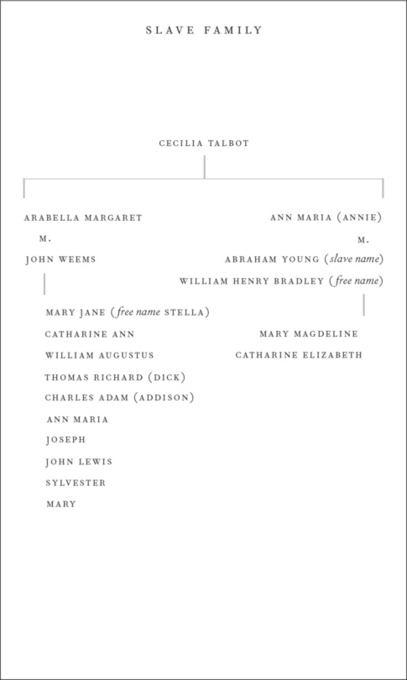
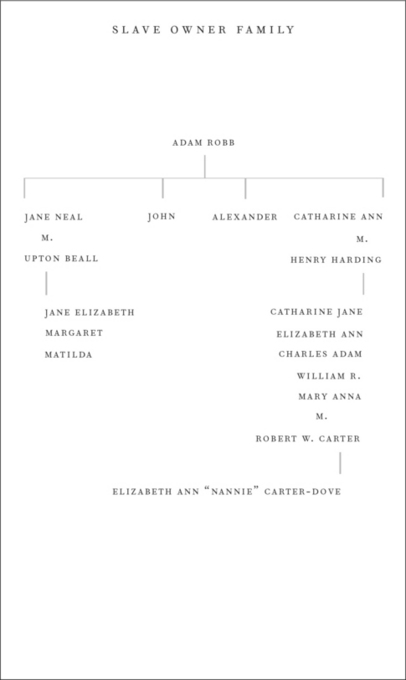
When John returned to Washington, he learned the heartbreaking news: the Hardings attracted by the prospect of sudden wealth or at least a loosening of their financial bindings had sold his wife and children to the slave traders for the goodly sum of $3,300. Arabella and their sons had been transferred to a slave pen in Washington, D. C., where they would be sold and sent to the South forever. Meanwhile, their remaining daughters had been sold to slave traders and were now held in the nearby town of Unity, Maryland. In an act filled with venom, the Hardings had stipulated that the Weems family not be sold to anyone in the vicinity of Washington.
Fuelled by desperation and love, John used his best powers of negotiation to save his family. A noble man in Washington pledged to loan him $1,600, but only if John could raise the remaining $1,700. This proved impossible to do in a short period of time and the pledge was lost. Such was the peculiar nature of the pledge it was to be all or nothing, perhaps because if the entire family were purchased, they could all work to repay it.
Time was running out. It was becoming clear that Johns children would be lost to the South and probably his beloved Arabella as well.
CHAPTER 1
JOHN AND ARABELLA WEEMS LIVED near the town of Rockville in Montgomery County, Maryland, just outside of Washington City, the capital of a country that claimed to embrace the ideals of independence and equality. In its infancy the United States was divided into the North and the South. Although it was halfway down the map and bordered on the free state of Pennsylvania, there was no mistaking that Maryland was in the South; everywhere, it seemed, was gentility and hospitality and slavery.
John Williams Weems and Arabella Margaret Talbot received the sacrament of marriage from St. Marys Roman Catholic Church on March 1, 1829, an uncommon privilege for the majority of slaves throughout the South, who consecrated their marriage by jumping the broom or other less formal rituals, if there was any ceremony at all. (In the fifteenth century, the Catholic church had ordered slaves to be baptized throughout the western hemisphere, including in Maryland, a largely Catholic state. Once baptized, these slaves became eligible for the sacrament of marriage and for a Christian burial.) The priest who married John and Arabella carefully noted in his ledger all of the ceremonies that he performed, for both slaves and their owners, occasionally recording unique details such as a Protestant husbands promise that any children born to the marriage would be baptized by a Catholic
